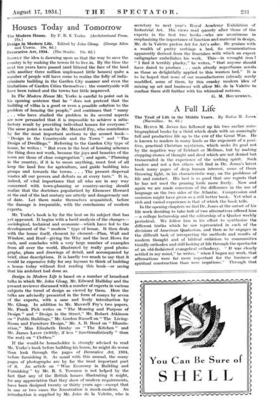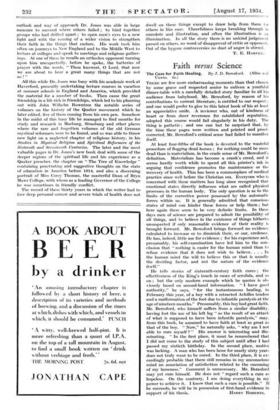A Full Life
The Trail of Life in the Middle Years. By Rufus M. Jones. (Macmillan. 88. 6d.) Da. Rurcrs M. JONES has followed up his two earlier auto- biographical books by a third which deals with an amazingly full and productive life up to the eve of the Great War. He is known to readers in many lands as the exponent of a posi- tive, practical Christian mysticism, which seeks its goal not by the negative way of Eckhart or Molinos, but by making stepping-stones of thought and deed which are not denied but transcended in the experience of the seeking spirit. Such readers and not a few others will find in Dr. Jones's latest book many pages of deep human interest, some of them throwing light, in his characteristic way, on the problems of life and conduct. His best is so good that one regrets that he has not used the pruning knife more freely. Now and again we are made conscious of the difference in the use of language on the two sides of the Atlantic. Compression and omission might have given us a still better book. Yet what a rich and varied experience is that of which the book tells.
In the opening chapters we find Dr. Jones at the outset of his life work deciding to take both of two alternatives offered him —a college lectureship and the editorship of a Quaker weekly periodical. We follow him in his effort to synthesize the different truths which he saw represented in each of the divisions of American Quakerism, and then as he engages in the difficult task of interpreting the methods and results of modern thought and of biblical criticism to communities timidly orthodox and still looking at life through the spectacles of an old-fashioned evangelical orthodoxy. "It was clearly settled in my mind," he writes, "when I began my work, that affirmations were far more important for the business of spiritual construction than were negations." Through that
outlook and way of approach Dr. Jones was able in large measure to succeed where others failed ; to bind together groups who had drifted apart ; to open men's eyes to a new light and with the coming of a wider vision to strengthen their faith in the things that endure. His work took him often on journeys to New England and to the Middle West to lecture at colleges and speak to meetings and religious gather- ings. At one of these he recalls an orthodox opponent turning upon him unexpectedly, before he spoke, the batteries of prayer with the words, "Thou knowest, 0 Lord, that now we are about to hear a great many things that are not so ! "
All this while Dr. Jones was busy with his academic work at Haverford, presently undertaking lecture courses in vacation at summer schools in England and America, which provided the material for a number of books. Then came the great friendship in a life rich in friendships, which led to his planning out with John Wilhelm Rowntree the notable series of volumes on the history of the Quaker movement which he later edited, five of them coming from his own pen. Somehow In the midst of this busy life he managed to find months for study and research in Marburg, Strasburg and other places where the rare and forgotten volumes of the old German mystical reformers were to be found, and so was able to throw new light on a neglected chapter of religious history, in his Studies in Mystical Religion and Spiritual Reformers of the Sixteenth and Seventeenth Centuries. The later and the most valuable pages in Dr. Jones's new book deal with some of the deeper regions of the spiritual life and his experience as a Quaker preacher, the chapter on "The Tree of Knowledge" containing penetrating and suggestive thoughts on the state of education in America before 1914, and also a discerning portrait of Miss Carey Thomas, the masterful Dean of Bryn Mawr College, with whom as a leading Governor of the College he was sometimes in friendly conflict.
The recoid of these thirty years in which the writer had to face deep personal sorrow and severe trials of health does not dwell on these things except to draw help from them lor others in like case. Cheerfulness keeps breaking through in anecdote and illustration, and often the illustration is an illumination. In all the story there is no unkind judgement passed on others, no word of disapproval of critic or opponent. Out of the bygone controversies no dust of anger is stirred.
T. E. MULVEY.



































 Previous page
Previous page